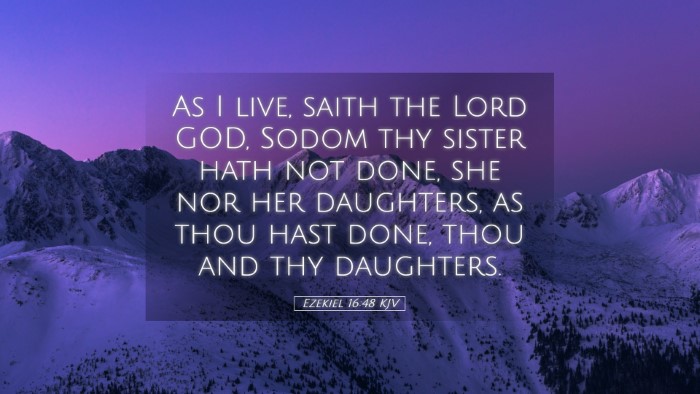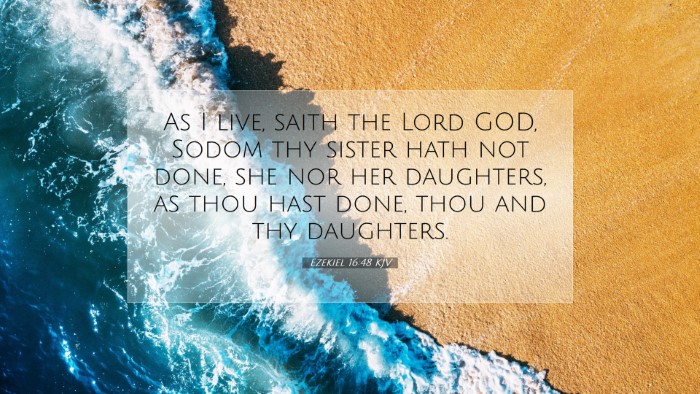Commentary on Ezekiel 16:48
Ezekiel 16:48 states, "As I live, saith the Lord God, Sodom thy sister hath not done, she nor her daughters, as thou hast done, thou and thy daughters." This verse holds profound implications for understanding the nature of sin, judgment, and the merciful character of God. In examining this scripture through the eyes of various public domain commentaries, we gain a rich and multifaceted perspective.
Understanding the Context
Before diving into the commentary, it is essential to grasp the context. Ezekiel, a prophet during the Babylonian exile, uses Sodom as a metaphor to describe Jerusalem’s unfaithfulness to God. This comparison highlights the depths of Judah's transgressions, suggesting that their sins exceed those of Sodom.
Insights from Matthew Henry
Matthew Henry, in his commentary, emphasizes the seriousness of idolatry and immorality that Israel displayed. He points out that regarding sin, Sodom is used as a benchmark for the severity of Judah's actions.
- Exceeding Sinfulness: Henry notes that Sodom was notorious for its gross sins, yet Judah's iniquities were positioned as even more abhorrent in the eyes of God.
- The Reality of Divine Judgment: He explains how God's judgment does not come capriciously; it comes as a righteous response to the people's persistent rebellion against Him.
- God’s Covenant Faithfulness: Despite Israel’s unfaithfulness, Henry reminds us that God remains faithful to His covenant, signaling the possibility of redemption through repentance.
Perspectives from Albert Barnes
Albert Barnes offers a textual analysis that aids in understanding the implications of this stark comparison. He expresses how God’s declaration about Sodom serves to illustrate the shameful state of Jerusalem.
- Comparison for Clarity: Barnes elucidates that God's declaration serves not only as a condemnation but also an urgent call for self-examination among His people.
- Twin Daughters of Sodom: He remarks on the phrase 'her daughters,' indicating that other cities of Judah also shared in the embarrassment of their mother (Jerusalem).
- Moral Degradation: Barnes argues that the verse exposes the moral degradation of Israel, suggesting that their spiritual condition was worse than the well-known sins of Sodom.
Reflections from Adam Clarke
Adam Clarke's commentary provides a nuanced reflection on the passage and highlights several critical theological insights.
- God's Living Assurance: Clarke stresses the phrase "As I live," indicating God's unchanging nature and commitment to justice as He confronts the sins of His chosen people.
- Call to National Reflection: He calls this a proverbial statement, encouraging not just individuals, but the nation as a whole, to pause and reflect upon their collective actions.
- Hope Amidst Judgement: Clarke asserts that despite the strong language of condemnation, the underlying tone maintains a glimmer of hope for reformation if the people turn back to God.
Theological Implications
This verse offers several theological implications that are relevant for both contemporary understanding and historical interpretation:
- Sin’s Universality: The extreme nature of Jerusalem’s sin compared to Sodom serves as a reminder of how deep-rooted sin can corrupt and deceive even those who are in a covenant relationship with God.
- The Nature of God's Holiness: It underscores the holiness of God, who requires absolute fidelity from His people while showing mercy to those who repent.
- God’s Justice and Mercy: The duality of God's nature - both just and merciful - comes through as He holds His people accountable while still offering them the chance for redemption.
Practical Applications
For pastors, students, theologians, and scholars, Ezekiel 16:48 can offer significant perspectives for teaching and reflection:
- Encouragement to Examine One's Self: This verse serves as a reminder that self-examination is crucial within the community of faith.
- Exhortation to Repentance: It is a call to continually return to God, acknowledging one’s weaknesses and the severity of sin to seek restoration.
- Awareness of Collective Responsibility: Leaders should guide their congregations in understanding the communal aspect of sin and the importance of collective righteousness.
Conclusion
In conclusion, Ezekiel 16:48 opens up a profound dialogue about the nature of sin, judgment, and the possibility of restoration. The insights provided by Matthew Henry, Albert Barnes, and Adam Clarke encourage a deeper engagement with the text and emphasize the importance of understanding our spiritual condition before God. As we reflect on these eternal truths, may we be inspired towards repentance, righteousness, and a renewed commitment to living in accordance with God’s standards.


